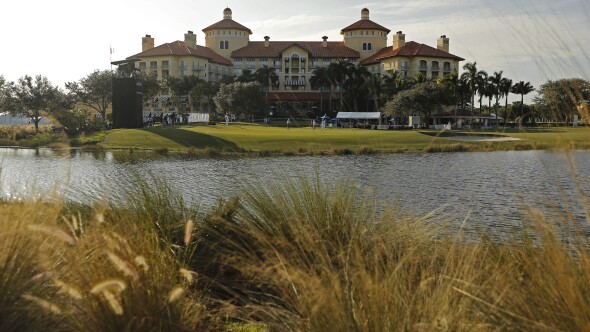In some ways, 2019 is helping spotlight the beauty of golf in cities. The PGA Tour is bringing events back to urban cores like this week's Rocket Mortgage Classic in Detroit. 2020 will return the Houston Open inside the loop at Memorial Park, and the PGA Championship is set for San Francisco's TPC Harding Park.
Golf in the metro can be cool, it seems. But while some cities celebrate new events or renovated municipal courses, there are many more examples of municipalities toiling with outdated or poorly-managed golf courses in valuable areas. That's particularly the case in tech boomtowns with exploding real estate costs. Golf courses occupying valuable urban land has been under assault in a big way recently, evidenced by a mix of articles from various publications (like here, here and here) to comments and actions from politicians to tweets gone viral.
GOLF IS BAD 🚨MAKE IT ILLEGAL🚨 ✅BAD USE OF LAND RESOURCES ✅COMMUNITY DOESNT BENEFIT BECAUSE OF BIG TAX BREAKS ✅RICH PEOPLE CULTURE ✅IT WOULD MAKE RICH PEOPLE MAD IF IT WERE ILLEGAL AND THAT’S GREAT
— dav (@ravidravidravid) November 12, 2018
Cities are bursting at the seams while golf courses often break even if they're lucky. But the idea of adding residents while simultaneously reducing recreation opportunities doesn't seem like a city worth living in, does it?
The curious dynamic at play is that while it would be political suicide for a council member or mayor to advocate for the development of parkland, the community sentiment can be far more mixed when it comes to protecting golf courses. It's a combination of two things: golf courses typically occupy 100-plus-acre parcels that appear more "develop-able" and the stigma of golf - even daily-fee and muni - being considered a rich man's playground. Just ask Malcom Gladwell, whose recent podcast episode zeroed in on Los Angeles' golf courses.
“If we allow this golf course in Park Hill to be sold and redeveloped into a concrete jungle, I believe no park in Denver is safe,”
Denver, one of the fastest-growing cities in the west, is currently renovating City Park Golf Course. But another metro area course, Park Hill Golf Course, is set to be sold to a development group next month, reports the Denver Post. Speculation is running rampant as to the future of the course (currently closed for drainage work) but there appears to be some protections in place thanks to a 1997 easement. But while the new owners are mum about future plans, many residents believe they will ask for city council to roll those easements back in the name of affordable housing.
Affordable housing is a common solution thrown around when the future of golf course land is up for debate. It can be an irresistible political tool to throw shade on the leisure class for the benefit of those with less. Seattle, home of Microsoft and Amazon among other giants, is another city where this is a hot topic. The Seattle Times reported earlier this summer that the city wanted to commission a report on what to do about the future of the city's courses that occupy 528 acre of valuable city land. From the article:
It would be a breach of our duty to the people of Seattle not to be really looking at what is best use of those golf courses, from everything to continuing as golf courses, to finding a way to use part of them as parks, to use part of them for affordable housing.
Fortunately for parkland advocates, a municipal law was passed nearly 25 years ago that prevents such development on parkland. But council-member terms are short and soon enough, calls will inevitably come to rewrite the rules and repurpose these acres once more. Golf's opponents in cities say the sport is "dying" but that's hardly the case. NGF reports its still the largest pay-to-play outdoor sport in the country and interest in the game remains high. 24.2 million people in the U.S. played on green grass facilities and that number rises to 33.1 million including non-traditional facilities like Topgolf. The vast majority of golf played in this country is at public facilities and the median green fee is still under $40, or the cost of a round or two of craft beers.
In Austin, Texas, the ongoing saga about the future of Lions Municipal Golf Course continues to drag along, now on a one-year extension of a lease to the city from the University of Texas. Density advocates want intense development built on this coveted, deeded tract of land west of downtown, mainly because they feel the surrounding expensive single-family homes on large lots haven't shouldered a fair burden of the city's growth. The battle made its way to the state capitol once again during legislative session, and while a "Save Historic Muny District" was recently passed in the state legislature, Muny advocates argue there isn't very much real protection in what was signed.
Minneapolis, which recently passed a law to end single-family zoning in the city, has also been auditing its golf courses. A consultant's report expressed cautious optimism but climate change is also pressuring city courses like Hiawatha, which has been suffering from more flooding than normal.
Golf courses caught in the dilemma of urban land use isn't just a U.S. issue. If you recall last fall, a mayoral candidate in Toronto, city planner Jennifer Keesmat, proposed turning Toronto's three city-owned golf courses into park space. (Weeks later, she was trounced by the incumbent John Tory.)

For golf to survive in these cities and in future land use battles, they'll need to attract more of the 14.7 million non-golfers who have expressed interest in the sport, according to NGF. But it would also behoove the industry to amplify its message to the greater public about the community health benefits of the game as well as the positives golf courses can have on their urban surrounds. Stewarding acreage that can be wildlife habitats to serving as large stormwater filtration centers and aquifer fillers are talking points that are growing in golf but are hardly top-of-mind outside the bubble. (In this Golf Advisor Podcast episode, architect Jeff Blume discusses how some Houston-area golf courses are designed to accommodate floodwaters.)
But perhaps the greatest area of improvement is finding ways for more residents to get onto and connect with the grounds, whether they have a club in their hand or not. The Old Course in St. Andrews, the world's oldest golf course, is a free public park on Sundays. Maybe one course in each city should do the same. Or, hosting morning running or fitness camps on the back nine in the morning before golfers show up or in the last hour or two of the day, finding spots for community gardens, classes on responsible landscaping or simply making the clubhouse a favorite gathering spot for all ages. Atlanta's renovation and redesign of Bobby Jones Golf Course, reducing the holes and creating a more multi-use space, may be another template to explore.
Making a golf course a coveted, multi-use gathering place for all city dwellers and not just golfers may help pay dividends later at city hall the next time a developer or political candidate suggests development. Many golfers would admit that a great day at an urban golf course, enjoying a peaceful enclave on the other side of the modern-day hustle, does in many ways feel a little too good to be true. Maybe "Growing the game" isn't just about how many rounds are played but how many people are out there who appreciate what the sport can contribute to a society.












Thanks @BrandonTucker for your article. I’m on TBOD for The First Tee of Greater Seattle and we couldn’t agree more with you and to save all the good we do and help with kids lives become better. Public Golf is not a rich persons sport.
Welcome to our dystopian future! Cities of concrete canyons, asphalt and little nature. Golf at the very least provides a park like setting with maintenance costs at least partly reduced by fees. Inner city golf is a benefit for the aging and lower incomes. Courses provide jobs and relief from noise and concrete. They can provide a valuable service in the treatment of wastewater and ultimately recreation for the inner city.
Once they are paved over, the green space is gone forever.
A Golf course is NOT just about recreation.
EVERY Course becomes a haven for Thousands Of insects, plants, animals and provides SPACE within another Concrete Metropolis!
Too hot? Go and experience the Golf course: it doesn’t hold heat like Concrete.
It is an Inner City Oasis in a New City’s jungle of streets and POLLUTION!
BREATHE and Think; before you Challenge a Golf Course’s value!
If we exit golf courses in the muni, the city will die of thirst.
I am a mature golfer and find it sad to see so many golf courses (mostly public) swallowed up by the exploding development onslaught. I have seen it in both Florida and Ohio. We need to hang on to as many as we can.
A simple (but, not easy) solution is to cut down on the number of people needing housing. We do that by restricting immigration and not having so many babies. Sooner or later, we will have to do this anyway. The sooner we start, the better for all of us.
I hope the above doesn't step on too many political toes.
Golf courses should be away from old women, snot snot nosed kids and popped collar “rules” D-bags
I do believe that inner city golf course need to be multi functional---most often as a park. However, for those critics who do not like to see a beautiful green expanse inside a grey building arena, I would suggest you advocate for the elimination of Central Park in the middle of New York.